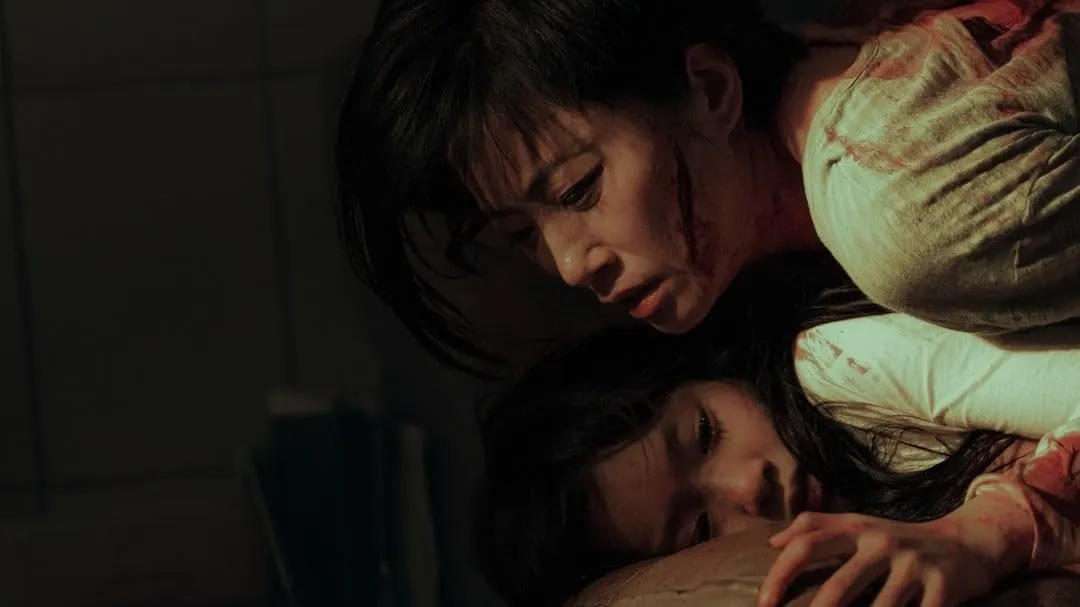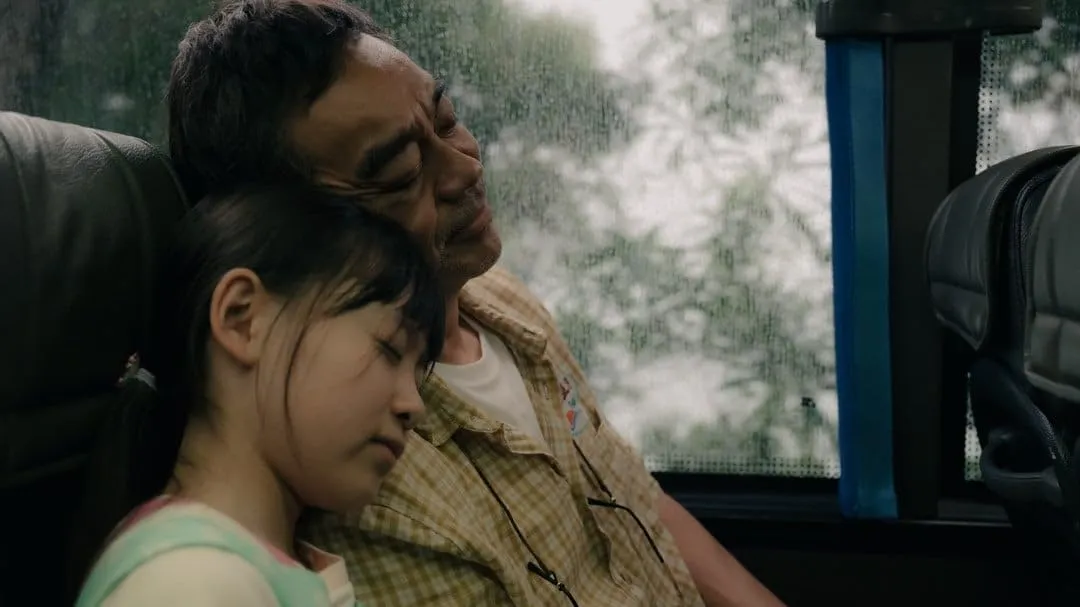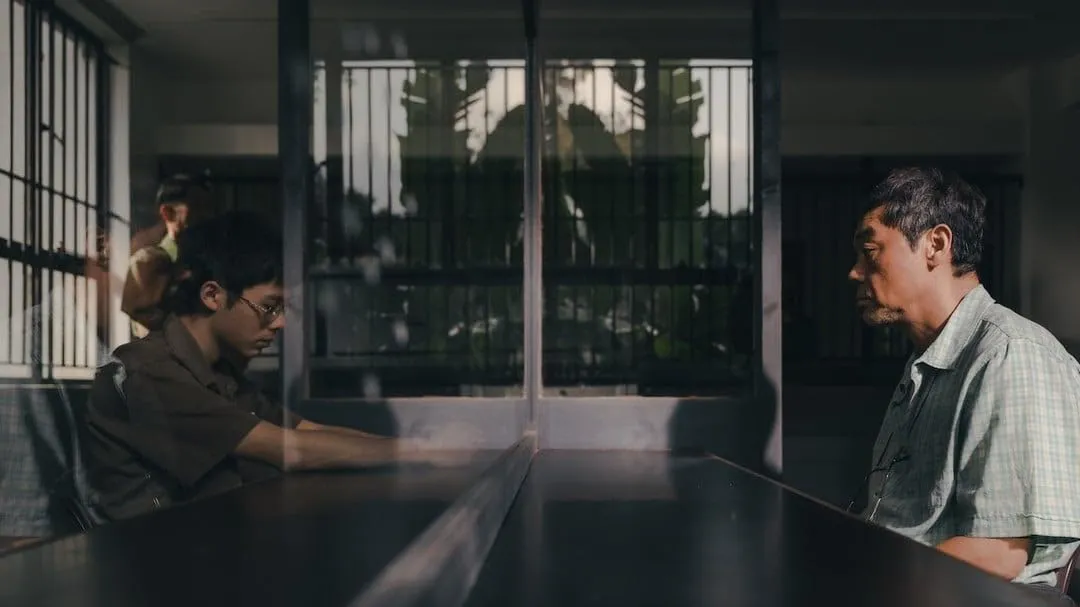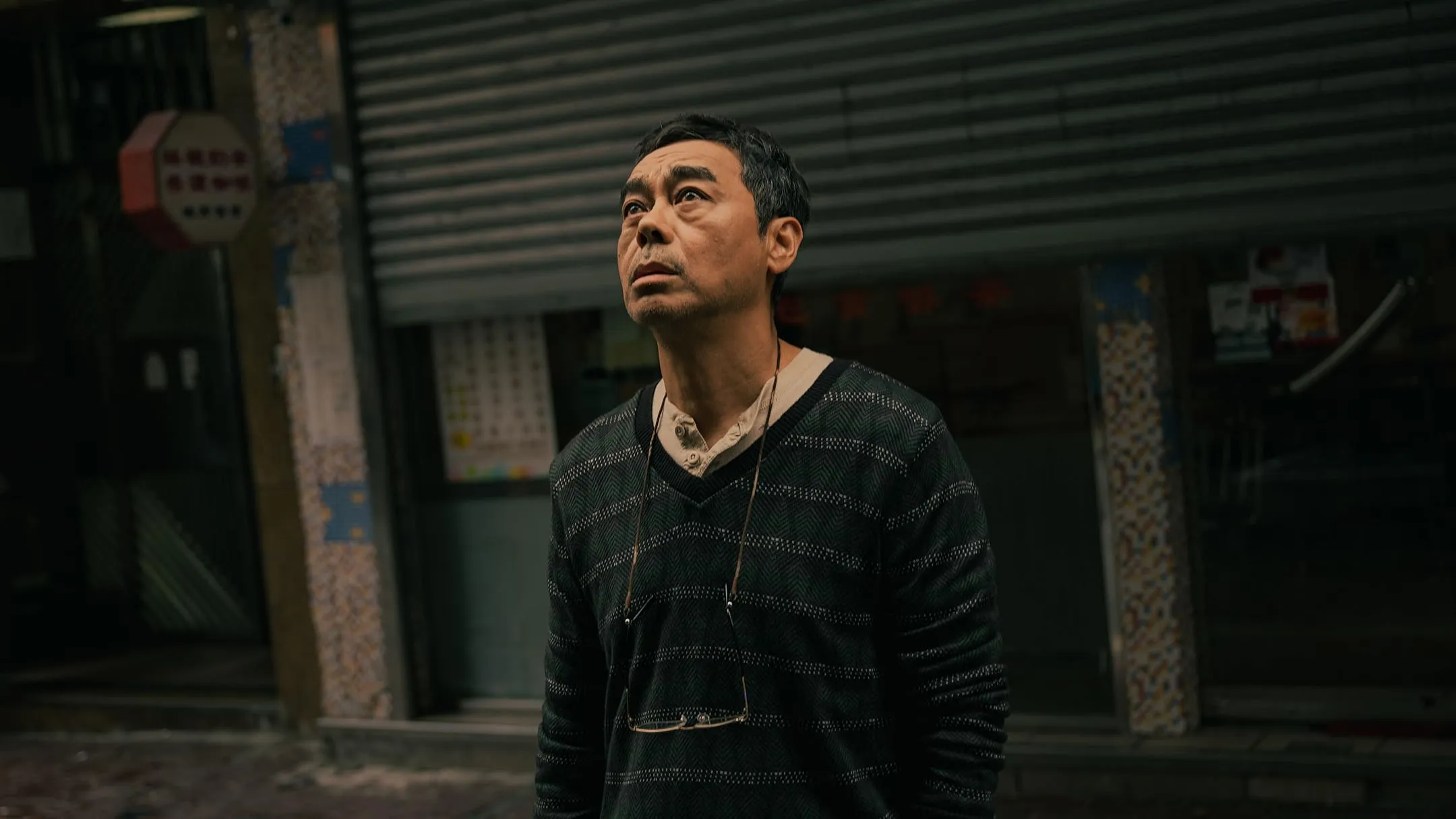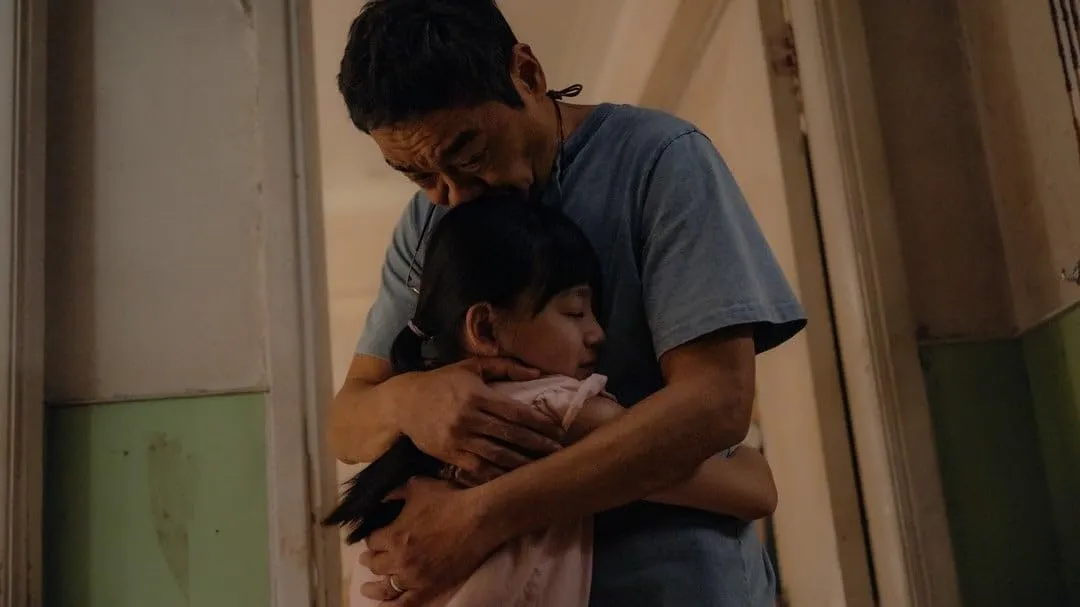In a terrifying beginning, “Papa” throws us into chaos: Ming, 15, kills his mother and sister with a meat knife, breaking up his family. The shocking event serves as the story’s pivot. Yuen (Sean Lau) and Yin (Jo Koo) run a busy 24-hour restaurant where community life thrives amidst the smell of fried noodles. Before the tragedy, the family seems normal. Tension, shown by Ming’s shyness and obvious mental problems, lies beneath this surface.
Yuen deals with guilt and the unanswered question, “Why?” in The Aftermath, a visceral study of grief. The non-linear narrative that reflects his broken mind draws us into a philosophical discussion of causality. Flashbacks show glimpses of better times, contrasting warmth with the cold reality of loss and reminding us how quickly joy can turn into despair.
This structure doesn’t follow a straight line; it reflects the chaos of grief and is stylistic. Between joy and despair, time stretches and contracts. Every flashback serves as a reminder that life is a mix of beautiful and horrifying experiences. This method may cause viewers to experience emotional disengagement, but it makes viewers reflect on Yuen’s journey and think about the problems of those around us who aren’t talking about them.
In the end, “Papa” forces us to face hard facts about family and mental illness, becoming a moving reflection on the fragility of human connections.
The Weight of Silence: A Character Study in “Papa”
Yuen puts on a tough exterior, a rock of calm strength amid chaos. His emotional turmoil is simmering beneath the surface, eerily calm but steamy. This attitude serves as a coping mechanism and a wall, keeping him apart from the family he wants to protect.
We witness a man struggling with guilt and confusion as he deals with the aftermath of Ming’s terrible act, desperately trying to understand how his son could do such terrible things to others. His relationship with Ming is full of unspoken words, a tragic comedy of misunderstandings that echo the societal reluctance to talk about mental health. Often, Yuen’s attempts to connect with his son feel like grabbing smoke with bare hands: they’re pointless but sorely needed.
There are a lot of different mental health problems in Ming’s character, as well as obsessions and delusions. He is shown as different ages and goes back and forth between being innocent and horrified by his. His obsession with environmental problems and what he sees as an almost end-of-the-world philosophy make him a tragic figure who thinks he is doing the right thing, which is not the case.
The societal demands placed on youth and the stigma surrounding mental illness are both uncomfortable topics brought up by this portrayal. If the world fails him, is he a monster or a child who doesn’t know what’s right? This question is left open-ended in the film, allowing viewers to grapple with their biases.
As a mother and wife, Yin, the family’s emotional center, lends warmth to the narrative. She is a calming presence that starkly contrasts the film’s darker themes. She shows us what a family with love and laughter used to be like. Yin symbolizes the emotional glue that holds the family together in addition to her job as a caregiver.
She deeply affects Yuen; she serves as a mirror that reflects his humanity and pushes him to face his feelings, no matter how difficult it may be. Yuen is devastated by the loss of Yin, but it also shows the fragility of family ties and makes us think deeply about the roles we play in the lives of those we love.
Ultimately, the interactions between these characters make for a rich tableau that looks at how deeply people connect and how societal forces shape our identities. “Papa” reflects more on the complexities of love, loss, and the eerie sound of silence than a narrative about a particular tragedy.
Echoes of Silence: Thematic Depth in “Papa”
“Papa” shows how grief can look in many ways. After the tragic loss of two loved ones, Yuen and his family are depicted in the film with raw, almost natural emotions. Yuen’s path through grief isn’t a straight line; instead, it’s like a labyrinth, where every turn goes to a dead end of despair and guilt.
A classic case of “keeping a stiff upper lip” (or is it more of a societal push to not be seen as weak?) can be seen in his calm exterior, which belies a torrent of feelings. As viewers are invited to witness not only Yuen’s loss of family but also his identity erosion, this internal conflict is palpable. He grapples with the frightening idea that he failed to protect his family, which makes him feel even more alone.
Ming’s mental problems are shown with a level of sensitivity that is both revealing and unsettling. The film makes us think about how societal views of mental illness, particularly in children, are formed. Ming’s actions, which are based on a mistaken worldview, make us wonder what parents and society should do to recognize and deal with mental health problems. His belief that he is saving the world is scary, but it also serves as a review of how we frequently ignore the warning signs of youth distress. In today’s world, where talks about mental health are still shrouded in stigma and misinformation, the film quietly suggests that mental illness is not just a personal fight but a societal failing.
At its core, “Papa” is a moving look at how tragedy affects family relationships, especially how they are shaped. Yuen has a lot of complicated feelings about Ming, and the themes of forgiveness and understanding become very important to him. Could a father forgive his son for doing something terrible?
The film asks this question in a way that is honest and feels both personal and general. The tragedy serves as a catalyst, bringing up previously unspoken problems and the fragility of the family’s bonds. Each character’s fight to understand reflects a larger societal problem: how do we deal with love and loss? Can we forget what we can’t forget?
“Papa” isn’t just a film about a horrible crime; it’s also a deep commentary on the human situation that shows how grief, mental illness, and familial love are all woven together heartbreakingly. It leaves the audience with questions rather than answers but with impressions that last long after the credits roll.
A Tapestry of Time: Philip Yung’s Directorial Style in “Papa”
A notable example of putting character psychology ahead of a typical plot-driven narrative is Philip Yung’s direction of “Papa.” This method allows viewers to enter the characters’ complicated thoughts, especially Yuen, whose quiet suffering becomes the film’s emotional center.
Rather than building a plot from beginning to end, Yung focuses on grief, guilt, and the search for understanding. Each scene is a brushstroke on an abstract canvas of family trauma as the narrative develops like a series of vivid memories.
Nonlinear storytelling isn’t just a trick; it reflects the confusion those dealing with severe loss feel. Time bends and warps, just like how grief changes how we see the world. One minute, we see Yuen setting up his business, and the next, we are thrown into a flashback that shows the warmth of family relationships. It’s a beautiful dance of light and shadow that shows the essence of human experience.
The way Yung uses chapter names is especially interesting because they act as guideposts on this emotional journey. Each title not only names a family member but also sums up the emotional weight of their narratives, making the audience ponder their importance. This technique encourages viewers to reflect on how each character’s story ties into the bigger theme of family ties, which helps viewers connect more deeply.
The structure makes engaging in emotional activity easier, allowing us to move back and forth between past joy and present sadness. It creates an almost poetic rhythm that connects with the audience, softening the impact of the tragedy with tender moments. Thanks to Yung’s skillful use of these narrative techniques, “Papa” is not just a story about a crime but a profound meditation on loss, love, and the never-ending search for redemption amid chaos.
Framing the Unfathomable: Cinematography in “Papa”
Color grading and lighting evoke a wide range of feelings in “Papa,” making the cinematography a powerful tool for storytelling. The flashbacks’ warm amber tones and the present’s cooler, more subdued color scheme create a visual contrast that reflects the characters’ internal states. This choice of color serves as a visual metaphor for nostalgia—a longing for what once was paired with the harsh truth of loss.
Depth-of-field and framing play important parts in how the audience perceives something. Yung frequently secures Yuen in the frame, emphasizing his emotional isolation in a busy restaurant full of life. This method makes us more aware of Yuen’s inner battle because he stands out, alone in a world that seems increasingly foreign. Such framing encourages viewers to connect with his situation while also reminding us of the societal disconnection that those who are experiencing grief frequently experience.
When used in important scenes, slow motion gives moments an emotional weight that stays with you long after they’re over. These moments are stretched, allowing the audience to savor the emotional complexities of the son, whether it’s a fleeting smile from Yin or a heartbreaking look between Yuen and Ming during prison visits. The slow-motion method turns everyday interactions into moving meditations on love and loss, making us acutely aware of the fragility of these connections.
The abundance of visual metaphors deepens the narrative. For instance, the picture of the restaurant that keeps coming up—a place of warmth and community—serves as a stark reminder of what has been lost. It symbolizes the essence of family life, tainted by tragedy. These complex visual choices improve the storytelling and encourage viewers to engage with the film on a deeper, more philosophical level, leading them to reflect on their familial ties and the societal pressures that shape them.
The Heart’s Echo: Emotional Impact in “Papa”
At every turn, “Papa” skillfully creates an emotional landscape that resonates strongly with its audience and begs for understanding. The film’s look at grief isn’t just a narrative device; it becomes a shared experience, making viewers feel like they are with Yuen during his darkest moments. This is a big deal in movies, where spectacle often rules over content.
Some scenes stay with you long after the movie is over. One very moving scene is when Yuen goes to see Ming in jail and feels the raw tension between love and betrayal. There is a tangible sense of despair in Yuen’s inability to connect with his son on a physical or emotional level. A poignant reminder of how words frequently fail us in moments of great loss, the silence between them is deafening. This scene shows an emotional block many people can connect to; it’s a universal truth in their story.
The scene showing Yin’s last moments further emphasizes the film’s emotional weight. As her warmth is contrasted with the coldness of approaching tragedy, viewers are left with a bittersweet pain. In short flashbacks, her laughter is recorded and serves as a haunting reminder of what has been lost forever. It’s a clever narrative method that plays on the audience’s collective memory of familial loss, making connections to our own experiences of loss.
The film’s ability to evoke such empathy is partly a testament to its study of the human condition—how we deal with relationships, tragedy, and the times when we fail to understand one another. Making it a film and a cultural touchstone, it speaks to the current societal conversation about mental health and family ties. In its quiet moments, “Papa” becomes a mirror that reflects our fears, regrets, and unwavering hope for peace in the face of chaos.
Fractured Reflections: Critical Moments in “Papa”
The film’s study of pain and the human capacity for recovery—or the painful struggle against it—is punctuated by crucial moments that capture its emotional core. Each serves as a testament to the film’s exploration of resilience. One of these times happens during a family dinner that seems normal.
There is a lot of laughter and warmth in the air, which is very different from the dark feelings about to come to the surface. The film effectively emphasizes the fragility of happiness in these brief moments of joy, forcing viewers to grapple with the fact that change is unavoidable. (Wouldn’t it be nice if Joy had a guarantee?)
A very important scene happens when Yuen finds a note that Yin wrote before she died. This shocking news makes him feel like he’s been through a loss and turns his grief into a haunting conversation with the past. The film’s theme of unfinished relationships is perfectly captured in this scene, which suggests that even though we may want to move on, the echoes of our loved ones often stay with us forever. Yuen’s emotional breakdown in this scene is a raw picture of vulnerability that makes viewers ponder their own experiences with grief and the significance of expressing love before it’s too late.
When Ming talks to Yuen about what he thinks are his failings as a father, it’s another important moment. As it reveals the complexities of family love, the film becomes increasingly tense in this scene. The claims made by Ming are not just a son’s act of rebellion; they reflect a larger societal criticism of parental duties and the generational gap that frequently widens in the face of trauma. This argument brings up the difficulty of understanding; it’s an investigation into how pain can both weaken and strengthen family ties.
The film’s main lesson about resilience is reflected in these individual moments. They make viewers think about the weight of sadness and the possibility of recovery in facing our demons. Recovery isn’t a straight line or an easy process, as “Papa” suggests. It’s a messy, often contradictory journey marked by hope and despair. As the movie’s credits roll, the audience is left with the impression that while pain is a part of life, there is also a chance to find comfort and connect in the chaos.
The Review
Papa
Grief, mental illness, and the fragility of family ties are all profoundly explored in "Papa." The film encourages viewers to reflect on their relationships with love and loss through its non-linear storytelling, rich visual symbolism, and emotionally charged performances. Yung's direction creates a narrative that resonates deeply in today's societal context, which skillfully balances pain and hope. The movie "Papa" has some heavy themes, but they are treated with sensitivity and insight, making it a very interesting watch.
PROS
- Deep emotional resonance and character development.
- Thought-provoking exploration of grief and mental health.
- Stunning cinematography that enhances storytelling.
- Non-linear narrative that effectively reflects the complexities of loss.
- Strong performances, particularly from the lead actors.
CONS
- Pacing may feel slow for some viewers.
- Heavy themes might be overwhelming at times.









































